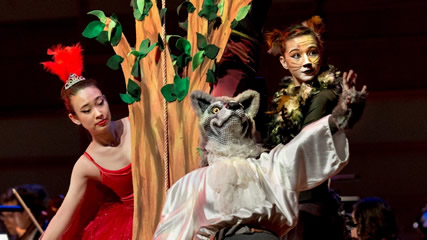The Chamber Orchestra of the Triangle presented its “Hidden Jewels” concert in the lovely Fletcher Hall at Durham’s historic Carolina Theatre. The concert featured flutist Mimi Stillman in her fourth concert with the ensemble. The Chamber Orchestra regularly presents rarely-performed works with excellent and refined musicianship, and today was no exception.
Director Lorenzo Muti began the concert with the overture to Oberon by Carl Maria von Weber. It began with an ethereal, mysterious atmosphere evoking the imagery of the fairies that this opera is based on. The melodies were playful and light, but the French horns helped to capture the glory of Oberon, King of the Fairies. The exchanges between the strings and winds were seamless, with lovely features of horn and clarinet soloists that exemplified Weber’s mastery of clarinet writing.
Next in the concert was Franz Joseph Haydn’s Symphony No. 101 in D, more commonly called “The Clock.” This was one of Haydn’s London Symphonies, meaning he was no longer confined to writing commissioned works for a strict employer, so it shows his more inventive, clever side. The orchestra was sensitive to the changing character of the symphony, exemplifying the contrasts between the ticking clock that can be heard in the second movement and the aerobic string parts in the fourth movement. The strings rose to the challenge of the piece, maintaining tight precision and a very robust sound. There was a tangible energy from the conductor and the ensemble that left the audience begging for more during the intermission.
The second half of the concert featured soloist Mimi Stillman, beginning with Saverio Mercadante’s Concerto for flute and strings in E minor. Mercadante was an Italian opera composer who today is virtually unknown. The concerto had a smaller orchestration of strings underneath Stillman, who was very engaged with the rest of the ensemble as she played. She communicated very effectively with Muti when she handed off solos for tuttis, and stayed very enthusiastic throughout her entire performance. The lines were fluid and relaxed, even though at times the solo was so complicated that it sounded like two melodies at the same time.
The concert ended with Czardas for flute and strings by Vittorio Monti, a work that is, as Stillman explained, “Italian with a hint of Gypsy.” Concertmaster Niccolo Muti had intricate solos as introduction and then later as dialogue with the flute. The contrasting sections of the Czardas, named for a traditional Hungarian couples dance, alternated between slow and fast, sounding improvisatory and virtuosic. Stillman’s expression and flair carried this piece and gave it style, ending with a flourish that swept the audience onto its feet.
This concert showcased the ensemble’s talent and depth of expression with both Classical and Romantic works, all with engaging rhythmic motives and virtuosic melodies that were just delightful. The Chamber Orchestra of the Triangle is a fine ensemble that presents such gems of works that one cannot experience anywhere else in the area. Its next concert, “Musical Landscapes,” will take place on February 17th at the Carolina Theatre and feature works by Nicolai, Schubert, Offenbach, Rossini, and Respighi.











